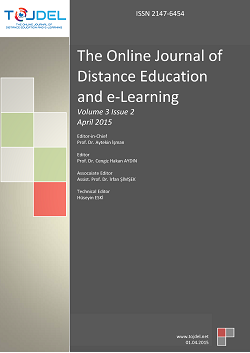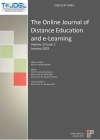TOJDEL - Volume 3 - Issue 2 - April 2015
 COMPARING E-TIVITIES, E-MODERATION AND THE FIVE STAGE MODEL TO THE COMMUNITY OF INQUIRY MODEL FOR ONLINE LEARNING DESIGN
COMPARING E-TIVITIES, E-MODERATION AND THE FIVE STAGE MODEL TO THE COMMUNITY OF INQUIRY MODEL FOR ONLINE LEARNING DESIGN Phemie Wright
Abstract: This paper explores the question as to whether learning design strategies of Etivities, e-Moderation and the 5-Stage Model by Professor Gilly Salmon, might be practically aligned with the Community of Inquiry Model (CoI). This is relevant to explore as there is very little literature that firstly presents on the current research in to these 'Salmon Methodologies'. Nor is there any literature at all that marries these methods as a possible guide for catering to the complexities of Social Presence, Cognitive Presence and Teaching presence within the CoI model. This report will explore, analyse and compare these methods and their alignment to the three CoI presences. Also providing an argument for consideration of their use in CoI online learning design. Limitations in the research and application of both models are explored and recommendations for future research that would enable the appropriate testing of this idea are then finally presented.
 DESIGN AND DEVELOPMENT OF MOBILE LEARNING APPLICATION
DESIGN AND DEVELOPMENT OF MOBILE LEARNING APPLICATION Maryam Farahmand Khanghah, Siti Hajar Binti Halili
Abstract: Access to the Internet and mobile devices provides a great opportunity for public to open and continuous education. Although mobile learning is not new subject in education but regarding to mobile technology features such as fast and easy accessibility, assimilates researcher, practitioner and educator's attention as channel to deliver their Instruction as well as many educational institutes, humane organizations and companies. On the other hand design and development of mobile learning applications need careful cognitive processes and technical skills which might make it more difficult for educators to consider leveraging and developing mobile learning application by themselves in their curriculum. This paper provided an overview report of previous studies conducted on mobile learning application and investigated challenges and difficulties of design and development of mobile learning application. Moreover in order to have better understanding of implementing a mobile learning application, a prototype of one mobile learning application is developed to educate and enhance motivation among adult to donate specific necessities for underprivileged students.
 EFFECTIVE TEACHING OF HIGHER-ORDER THINKING (HOT) IN EDUCATION
EFFECTIVE TEACHING OF HIGHER-ORDER THINKING (HOT) IN EDUCATION Tan Shin Yen, Siti Hajar Halili
Abstract: The teaching of Higher-order Thinking (HOT) has its own challenges and these challenges deserve due attention. In the 21st century, one critical aspect in discussing effective teaching and learning is examining the effectiveness of teachers in developing students’ capability to think while ensuring content mastery at the same time. The aim to develop and enhance students’ HOT has been a major educational goal. As a matter of fulfilling a national aspiration in education, the role of teachers in inculcating HOT is another important aspect of teaching HOT effectively.
 FROM GIRL SCOUT TO GROWN UP: EMERGING APPLICATIONS OF DIGITAL BAGES IN HIGHER EDUCATION
FROM GIRL SCOUT TO GROWN UP: EMERGING APPLICATIONS OF DIGITAL BAGES IN HIGHER EDUCATION Margaret WU, Dan WHITELEY, Margaret SASS
Abstract: Despite the fact that digital badges have been an emerging trend in education in recent years, some professionals in the field of higher education are uncertain as to how to incorporate the technology, specifically digital badges, into their practice. In this article, the authors address this uncertainty by discussing four applications of digital badges at a large Midwestern university. A brief summary of the origins of and educational theory behind digital badges precedes this discussion.
 FUTURE OF ONLINE EDUCATION IN CRISIS: A CALL TO ACTION
FUTURE OF ONLINE EDUCATION IN CRISIS: A CALL TO ACTION Julie Ann Nash
Abstract: Online education is growing rapidly and there is little doubt that it will continue to expand until it one day encompasses the majority of higher education course offerings. Higher education leaders agree that online education will continue to grow even in the face of a slight recent decline (Allen & Seaman, 2013). As the rise of online education began, concern also rose as to whether the quality of higher education would suffer as a result of this new fast tracked course of academia. The quality of education in general is in question. The average degree standards are lower in America (Cote & Allahar, 2011). Today in higher education it is almost unacceptable to expect students to be solely just that, students (2011). Working full time, while carrying a full load is becoming the acceptable norm (2011). This type of student is more often the student that elects an online education. Despite the current drawbacks, online education is still the best prospect for the future provided the barriers of faculty assessment and course design are addressed. Fear of student evaluations and administrative disapproval are causing grade inflation while simultaneously influencing course design. Instructors are designing courses that allow the student to easily pass the course, which in reality is a disservice to everyone involved. This literature review provides evidence to justify a warning to acknowledge the paradox of current faculty assessment practices and the codependent relationship with course structure, to ensure the future value of higher education.
 PERKS OF BEING A WALLFLOWER: LEARNING WITHOUT ENGAGING IN DISCUSSION FORUMS
PERKS OF BEING A WALLFLOWER: LEARNING WITHOUT ENGAGING IN DISCUSSION FORUMS Angelique Hamane, Farzin Madjidi, Stephanie Glick
Abstract: While much has been written about student engagement as measured by interactions in online discussion forums and its relationship to student success, little, if any, research has been done to connect student engagement as measured by non-interactions in online discussion forums and its relationship to student success. Learning Management Systems (LMSs) have the ability to measure student engagement by tracking the frequency of discussion forum posts and replies (interactions), and the frequency of discussion forum views (non-interactions). This initial exploratory study sought to determine whether relationships existed between students’ frequency of discussion forum activities—posts, replies, and views—and student success. Correlation and regression analyses were performed to determine type and strength of relationships. Non-probability purposive sampling was used to recruit 38 participants. Data showed meaningful findings, which yielded statistically significant, modest or moderate positive partial relationships in discussion forums posts, replies, and views, and student success. This study attempted to fill the gap in the literature by identifying additional measures of student engagement in online environments. Results from the study can potentially inform administrators and educators in making data-based decision to improve teaching and learning practices, thus increasing retention and graduation rates.
 TECHNOLOGY USE IN HEALTH EDUCATION: A REVIEW AND FUTURE IMPLICATIONS
TECHNOLOGY USE IN HEALTH EDUCATION: A REVIEW AND FUTURE IMPLICATIONS Holly M. Satterfield, M. Ed.
Abstract: Technology use in health education is growing and ever changing. Technology skills can greatly enhance the learning environment. Information and communication technology is an efficient support tool that enriches the quality of health education by delivering content through multiple modalities. The purpose of this review was to examine the existing literature on technology, particularly web 2.0, and social media integration within the health education classroom. Findings from the review indicate current trends in technology use can be beneficial in a health education classroom environment if introduced and used properly. Based on the results of the review, views on social media were mixed between being helpful for student use or hinder student performance. Use of social media is an area that health educators could improve upon to maximize the benefits of technology use in the classroom.


